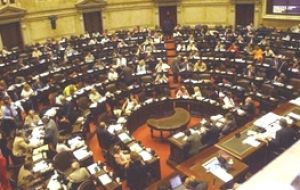MercoPress. South Atlantic News Agency
No end to “economic emergency” rule under the Kirchners
 Tight fist on the economy in spite of four years running of growth
Tight fist on the economy in spite of four years running of growth Argentina's Lower House Budget Committee gave this week majority support to the extension of the controversial Economic Emergency Act, passed during the 2002 crisis, until December, 2008.
The Economic Emergency Act allows the government to renegotiate public utility contracts and restructure public debt. It also allows for the reorganization of the financial, banking and currency trading systems. The extension was requested by the executive branch, which would like the bill to be passed before elected president Cristina Fernández de Kirchner's inauguration on December 10 despite criticism from the opposition that there is no reason to extend this emergency measure under the current economic circumstances. The finding also includes an extension to the sanitary emergency and the continuation of the jobless household heads subsidies for another year. Opposition Radical party announced that they will issue a minority report and centre-right deputies will sign the majority report in disagreement. The issue will be debated on the Lower House floor in an extraordinary session next Tuesday, and if it passes, will go to the regular Senate session on Wednesday. The Argentine Government had initially planned to launch the bill in the Senate and then send it to the Lower House, but changed its strategy as it was doubtful whether its majority in the Lower House would be enough to pass the bill in time for the inauguration. Cabinet Chief Alberto Fernández justified the request because "it preserves aspects of the day-to-day management of the economy," and highlighted the fact that the Government "has never used its extraordinary powers discretionally" and that Congress "has been able to control their use." He claimed that it is an essential tool to renegotiate public utility contracts. "Unless contracts are renegotiated, they will revert to the original terms in dollars, and the people would suffer," he warned. Radical party chairman Gerardo Morales accused Alberto Fernández of "not being fond of the truth" in his defense of the extension. He criticized Fernández for disregarding the Budget Act, "the law of laws to decide what will be done with the resources of the Argentine people". "Fernández seems to live on a submarine, this year he has made discretionary decisions to the tune of 25 billion pesos," he insisted.




Top Comments
Disclaimer & comment rulesCommenting for this story is now closed.
If you have a Facebook account, become a fan and comment on our Facebook Page!